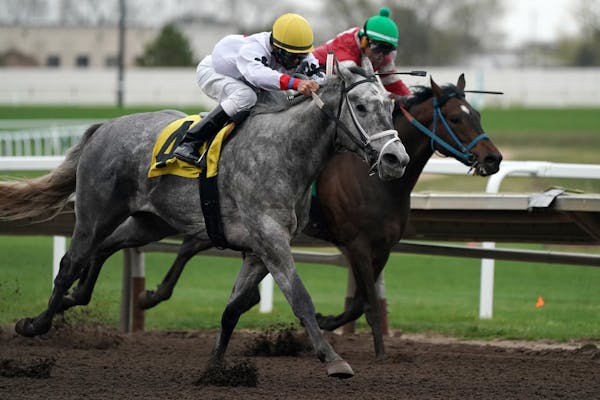In the stable area at Canterbury Park, every barn is filled with the perfume of the racetrack. All kinds of aromas blend in the air: sweet notes of hay and oats, the fresh, clean wood shavings on the stall floors, occasional pungent hits of liniment and horse sweat.
That familiar mix was overpowered by a different scent Tuesday in Bernell Rhone's barn. Even with the doors open and a breeze blowing, it smelled like the Pine-Sol used to disinfect buckets, tools and tack in the age of COVID-19.
"We put it in a spray bottle and use it twice a day, morning and night," Rhone said, looking toward two enormous jugs of the stuff near his office door. "The first week we were doing this, the guys would forget sometimes. But it's a habit now."
A 52-day racing season will begin in Shakopee on Wednesday, marking the return of a summer ritual delayed by the coronavirus. There will be thoroughbreds and quarter horses flying down the track, money won and money lost. So much else, though, will not be normal.
Only 250 fans will be allowed in, restricted to the third floor. The paddock will have every other stall taped off so horses can be saddled in a socially distant manner. Winner's circle photos, usually overstuffed with people, are limited to the jockey, trainer, groom and two horse owners.
The rhythms of life in the stable area have changed, too. Jockey agents, who typically spend their mornings visiting with trainers, have been designated as nonessential workers; that has kept Pete Antonucci outside the fence, where he lines up mounts for his riders by phone. The racing office, normally a busy hub of activity, is strangely quiet and dark.
Despite all that, there was little complaining.
"I'm just relieved we're able to race," trainer Virginia Peters said. "Yes, it's different. But we'll do whatever we have to do for this season to go on."
More than 1,000 horses have arrived at Canterbury for a season start that was delayed by 26 days. While most other sports have been idled by the pandemic, horse racing has been allowed to continue in several states, under strict disease-prevention protocols.
Canterbury had to submit similar plans to the governor's office and the Minnesota Racing Commission to get permission to race. There are rules for stable-area personnel and rules for race-day operations, many borrowed from other tracks.
Everyone must have their temperature taken. Only essential workers can come into the stable area. Tables in the clubhouse, where the 250 invited fans must stay, are being spread apart. Jockeys have been tested for COVID-19 and cannot use the track's "hot box," the sauna in which they sweat off weight.
"Nobody wants to get sick," said jockey Dean Butler, a five-time Canterbury riding champ. "Health and safety are the main thing. We don't want to do anything that could get the meet shut down."
Trainers and grooms must wear masks, in the barns and on race day. Everything from manure shovels to wheelbarrows to saddles to brushes must be sanitized daily.
Trainer Vic Hanson got used to the new routine when he raced at Oklahoma's Remington Park, which adopted similar rules when the pandemic began. Though masks were scarce in Oklahoma, he has more now and is having some extras made. He also had two jumbo cans of Lysol ready to spray everything down Tuesday.
"In a barn, it's hard," Hanson said. "I mean, it's a barn. But people get used to it."
Peters made her own mask, with horse-patterned fabric, and is using buckets of bleach and water to disinfect her equipment. Her small stable did not run elsewhere in the spring, so the protocols are all new to her.
She hopes some of the rules can be adjusted; for example, she needs an extra person to help saddle her best horse, the mammoth Where's Jordan, on race days. Antonucci, too, is hoping things will loosen up. The agent for two of Canterbury's best riders, Jareth Loveberry and Ry Eikleberry, now must park outside the stable gate at 5:30 a.m. and do business from his minivan.
Rhone expects it will be strange Wednesday as well. He raced at Tampa Bay Downs during the spring, with no spectators in the stands.
He said he will miss the buzz of the Canterbury crowd and greeting people on his way to the paddock. Like the smell of Pine-Sol, though, he can put up with it, if that's what it takes to keep the horses running.
"I thought for a while there might not be a Canterbury meet," Rhone said. "It's going to be different. But I'm just glad to be racing."





